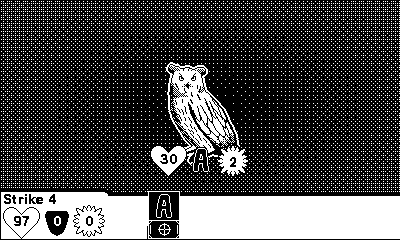Rendsword
Rendsword is a roguelike word-building game with no time limit, like Scrabble with swords. First, you pick a name from a short, randomized list. “That’s not my name,” you say. But the letters here are what’s important. If your name ends up being something like “Ingust Harlowe,” then those letters that make up your name are your ammunition. Each letter has its own value for attacking or healing, and some have other powers like discarding your whole hand to get new letters, or your opponent can’t attack that turn. Because that’s what you’re doing: attacking, with WORDS.
You’ll go up against 1-3 opponents at a time, and each will have an HP score and an attack rating. Reduce their HP by making words and utilizing the special targeting letters, which don’t have points but do allow you to actually aim at a certain enemy. Each turn you make a word or discard cards, your opponent will attack, as well, reducing your own HP by whatever their attack rating is. So say you’re fighting a bat with 20 HP and 4 attack, you need to hit them for 20 points worth of damage or they’ll hit you for 4 damage each turn until you do. You start at 99 HP and your damage stays from one fight to the next (you have opportunities to regain it between battles or with cards, though, and there are certain enemies that refill all your HP if you beat them), so try to win quickly by making long words. You can discard as many cards from your hand as you want by basically wasting a turn, but sometimes it’s necessary when you don’t have any vowels, or something like that.
I really appreciate that there’s no time limit on this game. It’s all about how many big words you can make. Sometimes you’ll get special items in between levels that give you extra powers, and these are randomized, too. There’s a lot of random things in here to encourage replays, and a brutal mode, also, for when you beat the regular game. There is an endpoint, but Powerdive doesn’t make it easy to reach. Every time I thought I was almost there, BAM, two bosses at once, or something else that almost – but not quite – felt unfair. There’s a rhythm to this game that really makes it feel like you’re able to do enough, especially once you start stacking the handiest relics.
The only complaint I have (and that I’ve seen others have, as well), is that it’s not really clear where the game’s dictionary limitations exist. Some proper nouns work and others don’t, and the same goes for words that I feel are used in real life but maybe not enough to make the cut. The Playdate doesn’t have unlimited memory, though, and you start memorizing your own personal list of words-that-aren’t-actually-words. Feels like part of the game, almost. Like you wouldn’t expect the NES version of Scrabble to even have the word “internet,” a word that – for ages and ages – my phone would automatically capitalize, years after that stopped being the grammar norm. This is the perfect game if you want to try to expand your vocabulary at the risk of a bat biting your nose. “Is that a word?” You’ll find out soon! Love it.
(Released December 6, 2023, on Itch, and February 27, 2024, on Catalog. Copy provided by developer.)
